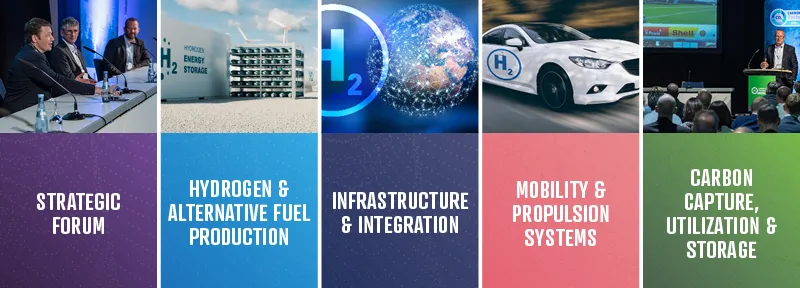What is new hydrogen technology?
)
As the global push towards sustainable energy solutions intensifies, hydrogen has emerged as a key player in the clean energy landscape. 'New' hydrogen technology refers to innovative developments and advancements in hydrogen production, storage, and utilisation that aim to make hydrogen more efficient, cost-effective, and environmentally friendly. In this article, we will explore the latest breakthroughs in hydrogen technology and their potential impact on various industries and applications.
Advanced hydrogen production methods:
Traditional hydrogen production methods, such as steam methane reforming and natural gas processing, are energy-intensive and generate significant carbon emissions. 'New' hydrogen technology focuses on developing cleaner, more sustainable production methods, including:
a. Green hydrogen production:
Green hydrogen is produced using electrolysis powered by renewable energy sources, such as wind or solar. This method generates zero greenhouse gas emissions, making it the most environmentally friendly way to produce hydrogen. Recent advancements in electrolysers, including the development of solid oxide and proton exchange membrane (PEM) technologies, have improved the efficiency and cost-effectiveness of green hydrogen production.
b. Biohydrogen production:
Biohydrogen refers to hydrogen produced from biomass or organic waste materials through processes like biological fermentation or thermochemical conversion. This method offers a sustainable, low-carbon alternative to traditional hydrogen production techniques and can potentially utilise waste streams from various industries.
Improved hydrogen storage and transportation solutions:
One of the challenges associated with hydrogen technology is its efficient storage and transportation. 'New' hydrogen technology aims to address these issues by developing innovative solutions, such as:
a. Solid-state hydrogen storage:
Solid-state hydrogen storage involves storing hydrogen within metal hydrides or other solid materials, which can offer higher energy densities and improved safety compared to conventional high-pressure storage systems. Researchers are exploring various materials and designs to develop efficient, cost-effective solid-state hydrogen storage solutions.
b. Liquid organic hydrogen carriers (LOHCs):
LOHCs are special organic compounds capable of chemically binding and releasing hydrogen. These carriers can store hydrogen at near-ambient conditions, making transportation and storage safer and more efficient. Advances in LOHC technology have the potential to overcome existing challenges in hydrogen logistics and facilitate broader hydrogen adoption.
Enhanced hydrogen fuel cell technology:
Hydrogen fuel cells convert hydrogen into electricity through an electrochemical process, producing only water and heat as byproducts. 'New' hydrogen technology focuses on improving fuel cell efficiency, lifespan, and cost-effectiveness through innovations such as:
a. Improved catalyst materials:
Traditional fuel cell catalysts, such as platinum, are expensive and subject to degradation over time. Researchers are developing new catalyst materials based on non-precious metals, nanostructures, and other novel designs to enhance fuel cell performance and durability while reducing costs.
b. Advanced fuel cell designs:
New fuel cell designs, including solid oxide fuel cells (SOFCs) and direct methanol fuel cells (DMFCs), aim to improve efficiency, flexibility, and compatibility with various hydrogen sources. These advancements can expand the range of applications for hydrogen fuel cells, from portable electronics to large-scale power generation.
Emerging hydrogen applications and industries:
'New' hydrogen technology is paving the way for novel applications and industries, offering opportunities for investment and growth. Some examples include:
a. Hydrogen-powered aviation and maritime transport:
Researchers are exploring the use of hydrogen as a zero-emission fuel for aviation and maritime transport. Innovative designs, such as hydrogen fuel cell-powered aircraft and ships, can help reduce the environmental impact of these industries and support their decarbonisation efforts.
b. Hydrogen-based energy storage and grid management:
Hydrogen can play a crucial role in energy storage and grid management, particularly as the adoption of renewable energy sources increases. Innovative hydrogen storage systems and power-to gas technologies can help balance energy supply and demand, address the intermittency of solar and wind power, and ensure grid stability.
c. Decarbonising industrial processes:
'New' hydrogen technology offers opportunities for decarbonising high-temperature industrial processes, such as steel and cement production, which currently rely on fossil fuels. By replacing carbon-intensive fuels with hydrogen, industries can significantly reduce their greenhouse gas emissions and contribute to global climate change mitigation efforts.
d. Green ammonia production:
Ammonia, a key ingredient in fertilisers and various industrial chemicals, is traditionally produced using natural gas, resulting in substantial carbon emissions. Hydrogen technology advancements enable the production of green ammonia using renewable hydrogen, creating a more sustainable alternative to conventional ammonia production methods.
'New' hydrogen technology encompasses a range of innovative advancements in hydrogen production, storage, and utilisation, aimed at making hydrogen a more efficient, cost-effective, and environmentally friendly energy solution. As research and development efforts continue to drive breakthroughs in this field, hydrogen technology has the potential to transform various industries and applications, supporting the global transition towards a sustainable, low-carbon future. Investors and stakeholders who recognise the potential of these emerging technologies stand to benefit from the growth and development of this promising sector.



)
)
)
)
)
)
)
)


)
)
)
)
)
)
)

)
)
)
)
)
)
)
)

)
)
)
)
)
)
)

)
)
)
)

)
)

)
)
)
)
)
)
)
)

)
)
)
)
)

)
)

)
)
)
)
)
)
)
)


)
)


